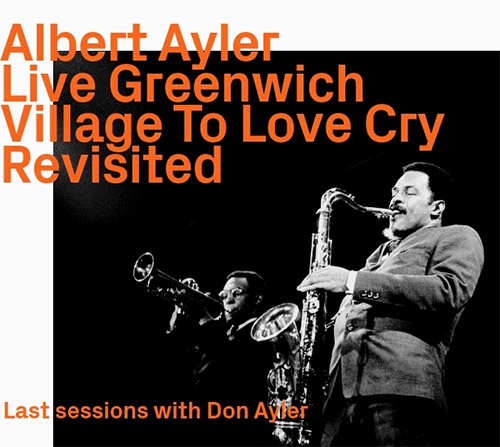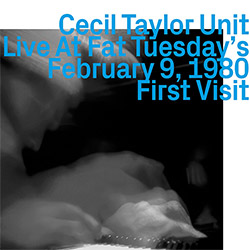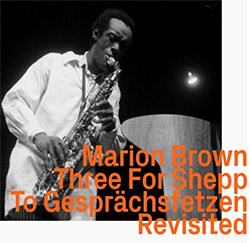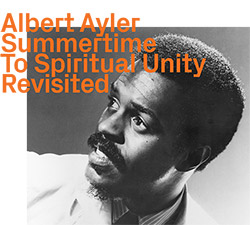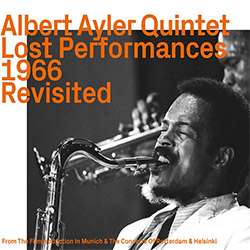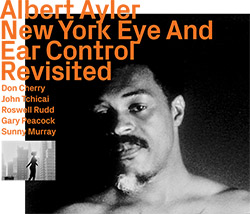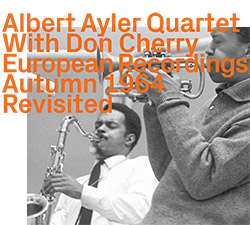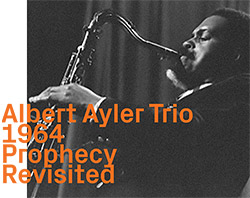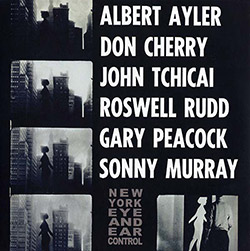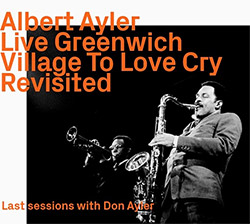
Bringing together two contrasting Impulse! albums from Aylers late 60's output: the exemplary free jazz release Live Greenwich Village in two sessions with core Ayler associates, brother Donald, Michael Sampson, Henry Grimes, Beaver Harris, &c.; then Ayler's challenging attempt to reach a more popular following in Love Cry, with Milford Graves taking the drummers chair.
In Stock
Quantity in Basket: None
Log In to use our Wish List
Shipping Weight: 2.00 units
Sample The Album:
Albert Ayler-tenor saxophone, alto saxophone, voice
Donald Ayler-trumpet
Michel Samson-violin
Bill Folwell-double bass
Henry Grimes-double bass
Beaver Harris-drums
Alan Silva-double bass
Joel Friedman-cello
Call Cobbs-harpsichord
Milford Graves-drums
Click an artist name above to see in-stock items for that artist.
UPC: 752156117124
Label: ezz-thetics by Hat Hut Records Ltd
Catalog ID: ezz-thetics 1171
Squidco Product Code: 34888
Format: CD
Condition: New
Released: 2024
Country: Switzerland
Packaging: Cardboard Gatefold
Tracks 1 and 2 recorded at the Village Vanguard, in NYC, on December 18th, 1966.
Tracks 3 and 4 recorded at The Village Theater, in NYC, on February 26th, 1966.
Tracks 5 to 10 recorded at Capital Studios, in NYC, on August 31st, 1967.
Tracks 11 and 12 recorded Capital Studios, in NYC, on February 13th, 1968.
In Greenwich Village originally released in 1967 on the Impulse! label as a vinyl LP with catalog code AS-9155.
Love Cry originally released in 1968 on the Impulse! label as a vinyl LP with catalog code AS-9165.
"Albert Ayler's relationship with his younger brother, Donald, was complex. While Albert convinced Donald to switch from saxophone to trumpet, a major move, Donald's influence on Albert's music was both subtle and deep, pushing him toward a more intense and overtly emotional (or spiritual) mode of delivery. According to biographer Richard Koloda, when Ayler asked Donald to officially join his group in 1964, part of the reason was his striking and strident musical voice which might ameliorate any tendencies toward a more comfortable songfulness. "If he played only six tones, these were so full of strength they just shot out." Donald also penned the oft-played composition, 'Bells', and performed off and on with the group.
The two reissues presented herein include the last sessions that Donald would record with his brother, bookending a turning point in Ayler's music. The Village Theater sessions, from late 1966 and early 1967 (the latter without Donald) mark, arguably, a high point in his work to that date, where the musical ecstasy he sought was as close to realization as he ever achieved-and new avenues may have been opening up-whereas Love Cry, from the summer of 1967, indicates at least partially a pivot point, redirecting the music toward, it was hoped, a more popular reception.
Originally issued on Impulse! as In Greenwich Village, the tracks are heard here in chronological order, two from December 1966, two from February 1967. The ensemble for each, apart from the Ayler brothers, includes bassist Bill Folwell and drummer Beaver Harris. On the December set, this quartet is augmented by second bassist Henry Grimes and violinist Michael Sampson. 'Truth Is Marching In', long a standard part of Ayler's repertoire, is given a rousing treatment. Ayler's furious solo is quickly followed by an equally incendiary one from Donald, where it's as if he's channeling the more extreme edges of Don Cherry's work and then taking it out even further. The theme returns, splinters into piercing fragments, coalesces again; it's a magisterial performance. The solemn, gospel-tinged 'Our Prayer' receives a moving, even poignant reading, the dual basses providing a rich bed from which the horns emerge.
For the February date, Grimes and Sampson were replaced by Alan Silva on bass and cellist Joel Friedman, and Donald is absent. Given his reuse of a relatively small number of compositions, this set stands out as, apparently, it's the only time 'For John Coltrane' and 'Change Has Come' were recorded (Coltrane was in attendance at the December date; the first piece was titled only after Coltrane's death that summer). It's very free-flowing for its first few minutes, Friedman up front with a wild solo, soon joined by a more subdued Ayler. Beaver Harris is also not heard on this piece, resulting in an Ayler-with-strings work, very striking in and of itself. It's tantalizing to think what might have ensued had Ayler continued to investigate the gentle and heartfelt expansiveness heard here. A rollicking performance of 'Change Has Come' concludes this Greenwich Village session, bearing more thematic material that provides the basis for some blistering solos but, again, unfurling in a very free manner.
In August of 1967, Ayler went to the studio to record Love Cry, his initial attempt at reaching a larger audience via incorporating some aspects of current pop music. The results were mixed and would continue to be highly problematic with ensuing albums. Love Cry can be considered in two sections: Side A (of the original LP) contains six short pieces (between two and four minutes), several from his standard repertoire while Side B has two longer works. On the plus side, Alan Silva was retained on bass and the great Milford Graves hired as drummer, providing Ayler with, arguably, the strongest and most imaginative rhythm section of his career. More oddly, harpsichordist Call Cobbs, an older musician who had worked with Billie Holiday and Wardell Gray, was brought on board, presumably to introduce a more pop-ish element into the mix, the harpsichord having recently been used by rock bands such as The Yardbirds (notably in their hit, "For Your Love") and the Rolling Stones as well in more schlocky, faux-classical pop blockbusters like Paul Mauriat's "Love Is Blue".
Ayler also vocalizes on a couple of songs, including the opening title track, in a kind of mild glossolalia. The brevity of the pieces means that there's nothing in the way of extended solos, more just iterations of the themes, something that, presumably, was thought to enhance the possibility of wider acceptance from the pop-attuned audience though, in retrospect, it's hard to imagine. Indeed, Graves' superb, coloristic drumming would seem to act against any ready graspability. Cobbs' harpsichord makes its first appearance on 'Omega', essentially providing a kind of florid obbligato to the strongly voiced lines of the brothers Ayler, who sound as powerful as ever; perhaps the closest sonic analogy at the time would be Sun Ra's clavioline work on some of his more tuneful numbers. On the B-side, 'Zion Hill' reads more like an extended prologue to some Ayleresque march that never appears, bearing both impassioned tenor work and some rather jarring harpsichord; the latter may have been innocuous enough on a standard piano, but here proves somewhat distracting. Donald's brilliant trumpet, inevitably conjuring forth calvary charges, leads off 'Universal Indians' over more wordless vocalizing from his brother, intertwining wonderfully from thenceforth with both voice and tenor. There's a little more room for solos, but basically it's an iteration of the bugle-like theme with bits of elaboration, including an all-too-brief bass/drums segment.
After this session, Donald would return to Cleveland, not appearing on any recording until 1981, while brother Albert would continue down that troublesome pathway toward a hoped for celebrity that would never be achieved in his lifetime."-Brian Olewnick, March 2024
Artist Biographies
• Show Bio for Albert Ayler "Albert Ayler (born July 13, 1936 - November 25, 1970) was an American avant-garde jazz saxophonist, singer and composer. After early experience playing R&B and bebop, Ayler began recording music during the free jazz era of the 1960s. However, some critics argue that while Ayler's style is undeniably original and unorthodox, it does not adhere to the generally accepted critical understanding of free jazz. In fact, Ayler's style is difficult to categorize in any way, and it evoked incredibly strong and disparate reactions from critics and fans alike. His innovations have inspired subsequent jazz musicians. His trio and quartet records of 1964, such as Spiritual Unity and The Hilversum Session, show him advancing the improvisational notions of John Coltrane and Ornette Coleman into abstract realms where whole timbre, and not just mainly harmony with melody, is the music's backbone. His ecstatic music of 1965 and 1966, such as "Spirits Rejoice" and "Truth Is Marching In", has been compared by critics to the sound of a brass band, and involved simple, march-like themes which alternated with wild group improvisations and were regarded as retrieving jazz's pre-Louis Armstrong roots. Early life and career Born in Cleveland, Ohio, Ayler was first taught alto saxophone by his father Edward, who was a semiprofessional saxophonist and violinist. Edward and Albert played alto saxophone duets in church and often listened to jazz records together, including swing era jazz and then-new bop albums. Ayler's upbringing in the church had a great impact on his life and music, and much of his music can be understood as an attempt to express his spirituality, including the aptly titled Spiritual Unity, and his album of spirituals, Goin' Home, which features "meandering" solos that are meant to be treated as meditations on sacred texts, and at some points as "speaking in tongues" with his saxophone. Ayler's experience in the church and exposure to swing jazz artists also impacted his sound: his wide vibrato was similar to that of gospel saxophonists, who sought a more vocal-like sound with their instruments, and to that of brass players in New Orleans swing bands. Ayler attended John Adams High School on Cleveland's East Side, and graduated in 1954 at the age of 18. He later studied at the Academy of Music in Cleveland with jazz saxophonist Benny Miller. Ayler also played the oboe in high school. As a teenager, Ayler's understanding of bebop style and mastery of standard repertoire earned him the nickname of "Little Bird", after Charlie "Bird" Parker, in the small Cleveland jazz scene. In 1952, at the age of 16, Ayler began playing bar-walking, honking, R&B-style tenor with blues singer and harmonica player Little Walter, spending two summer vacations with Walter's band. In 1958, after graduating from high school, Ayler joined the United States Army, where he switched from alto to tenor sax and jammed with other enlisted musicians, including tenor saxophonist Stanley Turrentine. Ayler also played in the regiment band, along with future composer Harold Budd. In 1959 he was stationed in France, where he was further exposed to the martial music that would be a core influence on his later work. After his discharge from the army, Ayler tried to find work in Los Angeles and Cleveland, but his increasingly iconoclastic playing, which had moved away from traditional harmony, was not welcomed by traditionalists. Ayler relocated to Sweden in 1962, where his recording career began, leading Swedish and Danish groups on radio sessions, and jamming as an unpaid member of Cecil Taylor's band in the winter of 1962-63. (Long-rumored tapes of Ayler performing with Taylor's group were released by Revenant Records in 2004, as part of a 10-CD set.) The album My Name Is Albert Ayler is a session of standards recorded for a Copenhagen radio station with local musicians including Niels-Henning Ørsted Pedersen and drummer Ronnie Gardiner, with Ayler playing tenor and soprano on tracks such as "Summertime".Early recording career In 1963, Ayler returned to the US and settled in New York City, where he continued to develop his personal style and occasionally played alongside free jazz pianist Cecil Taylor. 1964 was the most well-documented year of Ayler's career, during which he recorded many albums, the first of which was Witches and Devils in March of that year. Ayler also began his rich relationship with ESP-Disk Records in 1964, recording his breakthrough album (and ESP's very first jazz album) Spiritual Unity for the then-fledgling record label. ESP-Disk came to play an integral role in recording and disseminating free jazz. Spiritual Unity featured the trio that Ayler had just assembled that summer, including bassist Gary Peacock and drummer Sunny Murray. The liner notes of Spiritual Unity include a brief description of the musicians on that day, July 10, 1964, in the Variety Arts Recording Studio. Just before 1 PM, Sunny Murray arrived, a large, genial walrus....Gary Peacock was next, tall, thin, ascetic looking, and soft spoken....Albert Ayler was last, small, wary, and laconic. On July 17, 1964 the members of this trio, along with trumpet player Don Cherry, alto saxophonist John Tchicai, and trombonist Roswell Rudd, collaborated in recording New York Eye and Ear Control, a freely improvised soundtrack to Canadian artist and filmmaker Michael Snow's film of the same name. During this time, Ayler began to garner some attention from critics, although he was not able to foster much of a fan following. However, later in 1964, Ayler, Peacock, Murray, and Cherry were invited to travel to Europe for a brief Scandinavian tour, which too yielded some new recordings, including The Copenhagen Tapes, Vibrations, and The Hilversum Session. Ayler recorded Bells on May 1, 1965. It is a ferociously-paced 20-minute improvisation featuring his signature military-march influenced melodies. Spirits Rejoice was recorded on September 23, 1965 at Judson Hall in New York City, and features a much larger band than the sparse trio of his earlier album Spiritual Unity. The Encyclopedia of Popular Music describes Spirits Rejoice as a "riotous, hugely emotional and astonishingly creative celebration of the urge to make noise." Both albums feature Albert's brother, trumpet player Donald Ayler, who translated his brother's expansive approach to improvisation to the trumpet. Donald played with Albert until he experienced a debilitating nervous breakdown in 1967. In 1966 Ayler was signed to Impulse Records at the urging of Coltrane, the label's star attraction at that time. But even on Impulse, Ayler's radically different music never found a sizable audience. Ayler's first set for Impulse was recorded a few weeks before Christmas in 1966, entitled Albert Ayler in Greenwich Village. Ayler performed with his brother, Michel Samson, Beaver Harris, Henry Grimes, and Bill Folwell, and his Coltrane was in attendance. For a tune titled "For John Coltrane," Ayler returned to the alto saxophone for the first time in years. Ayler first sang on a recording in a version of "Ghosts" performed in Paris in 1966, in which his vocal style was similar that of his saxophone, with an eerie disregard for pitch. Ayler continued to experiment with vocals for the rest of his career. In 1967, John Coltrane died of liver cancer, and Ayler was asked to perform at his iconic funeral. It is said that during his performance, Ayler ripped his saxophone from his mouth at two points: once, to emit a cry of anguish, the other a cry of joy to symbolize his friend and mentor's ascension into heaven.Final years For the next two and half years Ayler began to move from a mostly improvisatory style to one that focused more closely on compositions. This was largely a result of pressures from Impulse who, unlike ESP-Disk, placed heavier emphasis on accessibility than artistic expression. In 1967 and 1968, Ayler recorded three LPs that featured the lyrics and vocals of his girlfriend Mary Maria Parks and introduced regular chord changes, funky beats, and electronic instruments. Ayler himself sang on his album New Grass, which hearkened back to his roots in R&B as a teenager. However, this album was remarkably unsuccessful, scorned by Ayler fans and critics alike. Ayler staunchly asserted that he wanted to move in this R&B and rock-and-roll direction, and that he was not simply succumbing to the pressures of Impulse and the popular music of that day, and it is true that Ayler heavily emphasizes the spirituality that seems to define the bulk of his work. New Grass begins with the track "Message from Albert," in which Ayler speaks directly to his listener, explaining that this album was nothing like his ones before it, that was of "a different dimension in [his] life." He claims that, "through meditation, dreams, and visions, [he has] been made a Universal Man, through the power of the Creator..." In 1968, Ayler submitted an impassioned, rambling open letter to Cricket magazine entitled "To Mr. Jones-I Had a Vision," in which he describes startling apocalyptic spiritual visions. He "saw in a vision the new Earth built by God coming out of Heaven," and implores the readers to share the message of Revelations, insisting that "This is very important. The time is now." His final album, Music Is the Healing Force of the Universe, featured rock musicians such as Henry Vestine of Canned Heat alongside jazz musicians like pianist Bobby Few. This was a return to his blues-roots with very heavy rock influences, but did feature more of Ayler's signature timbre variations and energetic solos than the unsuccessful New Grass. In July 1970 Ayler returned to the free jazz idiom for a group of shows in France (including at the Fondation Maeght), but the band he was able to assemble (Call Cobbs, bassist Steve Tintweiss and drummer Allen Blairman) was not regarded as being of the caliber of his earlier groups. Ayler disappeared on November 5, 1970, and he was found dead in New York City's East River on November 25, a presumed suicide. For some time afterwards, rumors circulated that Ayler had been murdered, with a long standing urban legend that the Mafia tied him to a jukebox. Later, however, Parks would say that Ayler had been depressed and feeling guilty, blaming himself for his brother's problems. She stated that, just before his death, he had several times threatened to kill himself, smashed one of his saxophones over their television set after she tried to dissuade him, then took the Statue of Liberty ferry and jumped off as it neared Liberty Island. He is buried in Highland Park Cemetery in Beachwood, Ohio." ^ Hide Bio for Albert Ayler • Show Bio for Donald Ayler "Donald Ayler (October 5, 1942 - October 21, 2007) was a jazz trumpeter and younger brother to saxophonist Albert Ayler. Born in Cleveland Heights, Ohio, he went on to work with his brother in the mid-1960s. In 1967 Donald had what he termed a "nervous breakdown", which affected his brother's life as well. In 1970 his brother's death affected him deeply. After that he did work with a septet in Florence, but remains best known for his connection to Albert. Donald appears in the documentary film My Name Is Albert Ayler where he talks about his and Albert's life, their music and their relationship. He is also featured in archival footage from concerts in Europe in 1966. The new sequences with him were filmed in Cleveland, Ohio in 2001 and 2002. Ayler suffered a sudden heart attack on Sunday October 21, 2007, and died at home in Northfield, Ohio." ^ Hide Bio for Donald Ayler • Show Bio for Michel Samson Michel Samson, born in 1944 in Rijswijk, was an American violinist of Dutch origin best known for being a member of the Albert Ayler Quintet. Samson began began studying the violin when he was five years old, receiving a grant from the Dutch Government to study in Germany at the age of 11. After that he studied with Yehudi Menuhin in Rome, where composer Gian-Carlo Menotti arranged a grant for him to study in New York with Ivan Gelamian. He met Albert Ayler in 1966 while performing with the Cleveland Orchestra and joined his band. He also was a professor and violinist in residence at the Farleigh Dickinson University in New Jersey. ^ Hide Bio for Michel Samson • Show Bio for Bill Folwell William Folwell was a Jazz bassist and trumpet player, Born May 1, 1939 in Rochester, NY; died on October 2, 2019. In 1968 he was a string bassist, vocalist and trumpet player for Ars Nova. He is known for the groups Albert Ayler Quintet, Ars Nova, The Mystic Knights Of The Oingo Boingo, The Oddyssey Quartet. ^ Hide Bio for Bill Folwell • Show Bio for Henry Grimes "As of the beginning of 2016, master jazz musician Henry Grimes (acoustic bass, violin, poetry, illustrations) had played more than 615 concerts in 31 countries (including many festivals) since 2003, when he made his astonishing return to the music world after 35 years away. He was born and raised in Philadelphia and attended the Mastbaum School (1949-52) and Juilliard (1952-54). As a youngster in the '50's and early '60's, he came up in the music playing and touring with Willis "Gator Tail" Jackson, Arnett Cobb, "Bullmoose" Jackson, "Little" Willie John, King Curtis, and a number of other great R&B / soul musicians; but drawn to jazz, he went on to play, tour, and record with many great jazz musicians of that era, including Albert Ayler, Don Cherry, Benny Goodman, Coleman Hawkins, Roy Haynes, Lee Konitz, Steve Lacy, Charles Mingus, Thelonious Monk, Gerry Mulligan, Sunny Murray, Sonny Rollins, Pharoah Sanders, Archie Shepp, Cecil Taylor, and McCoy Tyner. Sadly, a trip to the West Coast to work with Al Jarreau and Jon Hendricks went awry, leaving Henry in Los Angeles at the end of the '60's with a broken bass he couldn't pay to repair, so he sold it for a small sum and faded away from the music world. Many years passed with nothing heard from him, as he lived in his tiny rented room in an S.R.O. hotel in downtown Los Angeles, working as a manual laborer, custodian, and maintenance man, and writing many volumes of handwritten poetry. He was discovered there by a Georgia social worker in 2002 and was given a bass by William Parker, and after only a few weeks of ferocious woodshedding, Henry emerged from his room to begin playing concerts around Los Angeles and shortly afterwards made a triumphant return to New York City in May, 2003 to play in the Vision Festival. Since then, often working as a leader, he has played, toured, and / or recorded with many of this era's musical and literary heroes, such as Chris Abani, Rashied Ali, Geri Allen, Marshall Allen, Barry Altschul, Fred Anderson, Tatsu Aoki, Newman Taylor Baker, Billy Bang, Harrison Bankhead, Amiri Baraka, Joey Baron, Hamiet Bluiett, Dave Burrell, Roy Campbell Jr., Alex & Nels Cline, Cooper-Moore, Marilyn Crispell, Connie Crothers, Ted Curson, Andrew Cyrille, Thulani Davis, Toi Derricotte, Bill Dixon, Pierre Dorge, Hamid Drake, Paul Dunmall, Cornelius Eady, Kahil El'Zabar, Douglas Ewart, Bobby Few, Charles Gayle, Melvin Gibbs, Yoriyuki Harada, Craig Harris, Graham Haynes, Karma Mayet Johnson, Edward "Kidd" Jordan, Andrew Lamb, Nathaniel Mackey, Maria Mitchell, Nicole Mitchell, Roscoe Mitchell, Elaine Mitchener, Louis Moholo-Moholo, Meredith Monk [recording only], Jemeel Moondoc, Jason Moran, David Murray, Sunny Murray, Amina Claudine Myers, Zim Ngqawana, Kresten Osgood, William Parker, HPrizm (High Priest, Kyle Austin), Odean Pope, Avreeayl Ra, Tomeka Reid, Vernon Reid, Marc Ribot, Matana Roberts, Orphy Robinson, Brandon Ross, Lee Mixashawn Rozie, Mark Sanders, Rasul Siddik, Wadada Leo Smith, Warren Smith, Tyshawn Sorey, Sekou Sundiata, Tani Tabbal, Jamaaladeen Tacuma, Aldo Tambellini, Greg Tate, Cecil Taylor (reunion), Chad Taylor, John Tchicai, Pat Thomas, Henry Threadgill, Edwin Torres, Dwight Trible, Jeff "Tain" Watts, Ed Wilkerson Jr., James Zollar, John Zorn, and too many others to list here. In the past few years, Henry has also held a number of residencies and offered workshops and master classes on major campuses, including: Berklee College of Music (Boston); Buffalo Academy for Visual & Performing Arts (upstate New York); CalArts, hosted by Wadada Leo Smith (Valencia, California); the Carlucci School, with Andrew Lamb and Newman Taylor Baker (Portugal); Hamilton College of Performing Arts, with Rashied Ali (upstate New York); Humber College (Toronto); JazzInstitut Darmstadt (Germany); Mills College, hosted by Roscoe Mitchell (Oakland, California); New England Conservatory (Boston, Massachusetts); Scuole Bruscio and Scuole Poschiavo (Switzerland); the University of Gloucestershire at Cheltenham (U.K.); University of Illinois at Urbana-Champaign, Illinois; University of Michigan at Ann Arbor; and several more. Henry can be heard on about a dozen new recordings, made his professional debut on a second instrument (the violin) at the age of 70 alongside Cecil Taylor at Lincoln Center, has seen the publication of the first volume of his poetry, "Signs Along the Road," by a publisher in Cologne, and creates illustrations to accompany his new recordings and publications. He has received many honors in recent years, including four Meet the Composer grants. Mr. Grimes can be heard on 90+ recordings on various labels, including Atlantic, Ayler Records, Blue Note, Columbia, ESP-Disk, ILK Music, Impulse!, JazzNewYork Productions, Pi Recordings, Porter Records, Prestige, Riverside, and Verve. He is the subject of a new biography published in London, "Music to Silence to Music: A Biography of Henry Grimes" by Dr. Barbara Frenz, with a beautiful foreword by Sonny Rollins (http://tinyurl.com/h9f8mo4). And on July 7th, 2016, Henry received a Lifetime Achievement Award and played a full evening of concerts with groups of his own choosing in the Arts for Art / Vision Festival at Judson Memorial Church in New York City , where he had also played and recorded with Albert Ayler's group back in the '60s. Henry Grimes is now a permanent resident of New York City and welcomes students here." ^ Hide Bio for Henry Grimes • Show Bio for Beaver Harris "William Godvin "Beaver" Harris (April 20, 1936 - New York, New York, December 22, 1991) was an American jazz drummer who worked extensively with Archie Shepp. Harris was born in Pittsburgh, Pennsylvania. Coming from an athletic family, he played baseball as a teenager for the Kansas City Monarchs (then part of the Negro American League) and was scouted by major league teams Brooklyn Dodgers and New York Giants. It was only after he was in the army that he began playing drums. After his national service ended in 1963 he moved to New York City and was encouraged to pursue a musical career by Max Roach. While in New York he worked and/or toured with Marion Brown, Dexter Gordon, Albert Ayler, Joe Henderson, Freddie Hubbard, Clifford Jordan, Howard Johnson, Sheila Jordan, Lee Konitz, Thelonious Monk, Roswell Rudd, Sonny Rollins, McCoy Tyner, Sonny Stitt, Clark Terry, Chet Baker, Doc Cheatham and Larry Coryell among other musicians. In addition, Harris founded a "world music" band and called it "The 360 Degree Music Experience". The band included some of the most significant artists of the time, including Buster Williams, Hamiet Bluiett, Don Pullen, Jimmy Garrison, Ron Carter, Ricky Ford, Titos Sompa and many others. Harris died of prostate cancer in New York at the age of 55. His children, William Godvin Harris III, Verna Harris Vaughn, and Portia Harris." ^ Hide Bio for Beaver Harris • Show Bio for Alan Silva "Alan Silva (born Alan Lee da Silva; January 22, 1939 in Bermuda) is an American free jazz double bassist and keyboard player. Silva was born a British subject to an Azorean/Portuguese mother, Irene da Silva, and a black Bermudian father known only as "Ruby". He emigrated to the United States at the age of five with his mother, eventually acquiring U.S. citizenship by the age of 18 or 19. He adopted the stage name of Alan Silva in his twenties. Silva was quoted in a Bermudan newspaper in 1988 as saying that although he left the island at a young age, he always considered himself Bermudian. He was raised in the Harlem neighborhood of New York City, where he first began studying the trumpet, and moved on to study the upright bass. Silva is known as one of the most inventive bass players in jazz and has performed with many in the world of avant-garde jazz, including Cecil Taylor, Sun Ra, Albert Ayler, Sunny Murray, and Archie Shepp. Silva performed in 1964's October Revolution in Jazz as a pioneer in the free jazz movement, and for Ayler's Live in Greenwich Village album. He has lived mainly in Paris since the early 1970s, where he formed the Celestrial Communication Orchestra, a group dedicated to the performance of free jazz with various instrumental combinations. In the 1990s he picked up the electronic keyboard, declaring that his bass playing no longer surprised him. He has also used the electric violin and electric sarangi on his recordings. In the 1980s Silva opened a music school I.A.C.P. (Institute for Art, Culture and Perception) in Central Paris, introducing the concept of a Jazz Conservatory patterned after France's traditional conservatories devoted to European classical music epochs. Since around 2000 he has performed more frequently as a bassist and bandleader, notably at New York City's annual Vision Festivals." ^ Hide Bio for Alan Silva • Show Bio for Joel Friedman "American free jazz cellist, but more prominently a prolific film director (feature films, documentaries, commercials) for Hollywood studios, television stations, etc." ^ Hide Bio for Joel Friedman • Show Bio for Call Cobbs "Harvey Call Cobbs Jr. (January 30, 1911 - September 21, 1971), was an American jazz pianist, electric harpsichordist, and organist. He is remembered for his work with saxophonist Albert Ayler in the mid- and late-1960s. Cobbs was born in Urbana, Ohio, to Harvey Call Cobbs Sr. and Ethel Hill Cobbs. His father, known as Harry Cobbs, was a church janitor. In his youth, Cobbs served as companion and guide to the pianist Art Tatum and later accompanied Billie Holiday and replaced Hampton Hawes in the band of Wardell Gray. Cobbs worked and recorded with the alto saxophonist Johnny Hodges in 1954, when Hodges' band included John Coltrane. He studied the Schillinger System of musical composition. He is best remembered for his work with the free jazz saxophonist Albert Ayler from 1964 through 1970, playing piano, rocksichord, and electronic organ in live performances and recordings. He also acted as Ayler's copyist and musical director. When Ayler's body was found floating in the East River in New York City on November 25, 1970, Cobbs was called upon to identify the body. Cobbs was killed in a hit and run collision on September 21, 1971. He died at Jacobi Medical Center in The Bronx at the age of 60." ^ Hide Bio for Call Cobbs • Show Bio for Milford Graves "Milford Graves (born August 20, 1941 in Queens, New York) is an American jazz drummer and percussionist, most noteworthy for his early avant-garde contributions in the early 1960s with Paul Bley and the New York Art Quartet alongside John Tchicai, Roswell Rudd, and Reggie Workman. He is considered to be a free jazz pioneer, liberating the percussion from its timekeeping role. In fact, many of his music contemporaries, musician inspirees, and fans worldwide would argue that Graves is perhaps the most influential known musician in the development and continuing evolution of free-jazz/avant-garde music, to date. Milford Graves taught at Bennington College, in Bennington, Vermont, as a full-time professor from 1973 until 2011, when he was awarded Emeritus status. Initially playing timbales as a kid growing up in Queens, Graves has worked as a sideman and session musician with a variety of jazz musicians throughout his career, including Pharoah Sanders, Rashied Ali, Albert Ayler, Don Pullen, Kenny Clarke, Don Moye, Andrew Cyrille, Philly Joe Jones, Eddie Gómez, and John Zorn. He has invested his time in research within the field of healing through music. In 2013, Milford Graves along with Drs.Carlo Tremolada and Carlo Ventura received a patent for an invention that relates to a process of preparing a non-expanded tissue derivative, that is not subjected to cell proliferation in vitro, which has a vascular-stromal fraction enriched in stem and multipotent elements, such as pericytes and/or mesenchymal stem cells, or for preparing non-embryonic stem cells obtained from a tissue sample or from such tissue derivative, wherein the tissue derivative or such cells are subjected to vibrations derived from a heart sound to control the degree of differentiation or possible differentiation of the stem and multipotent elements into several other types of cells and optimize their potency. The invention relates also to a device for carrying out the process, to stem cells obtainable by the process as well as a drug for the regeneration of an animal tissue." ^ Hide Bio for Milford Graves
6/12/2024
Have a better biography or biography source? Please Contact Us so that we can update this biography.
6/12/2024
Have a better biography or biography source? Please Contact Us so that we can update this biography.
6/12/2024
Have a better biography or biography source? Please Contact Us so that we can update this biography.
6/13/2024
Have a better biography or biography source? Please Contact Us so that we can update this biography.
6/12/2024
Have a better biography or biography source? Please Contact Us so that we can update this biography.
6/12/2024
Have a better biography or biography source? Please Contact Us so that we can update this biography.
6/12/2024
Have a better biography or biography source? Please Contact Us so that we can update this biography.
6/13/2024
Have a better biography or biography source? Please Contact Us so that we can update this biography.
6/12/2024
Have a better biography or biography source? Please Contact Us so that we can update this biography.
6/12/2024
Have a better biography or biography source? Please Contact Us so that we can update this biography.
Track Listing:
1. Truth Is Marching On 12:30
2. Our Prayer 4:38
3. For John Coltrane 13:36
4. Change Has Come 6:15
5. Love Cry 3:56
6. Ghosts 2:49
7. Omega 3:17
8. Dancing Flowers 2:22
9. Bells 3:11
10. Love Flower 3:32
11. Zion Hill 6:09
12. Universal Indians 9:52
Hat Art
Improvised Music
Jazz
Free Improvisation
NY Downtown & Metropolitan Jazz/Improv
Quintet Recordings
Song Based Music
Jazz Reissues
Staff Picks & Recommended Items
New in Improvised Music
Recent Releases and Best Sellers
Search for other titles on the label:
ezz-thetics by Hat Hut Records Ltd.


